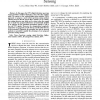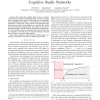JSAC
2011
13 years 6 months ago
2011
JSAC
2011
13 years 6 months ago
2011
Abstract—The problem of cognitive access of channels of primary users by a secondary user is considered. The transmissions of primary users are modeled as independent continuous-...
JSAC
2011
13 years 6 months ago
2011
Abstract—In decentralized cognitive radio (CR) networks, enabling the radios to establish a control channel (i.e., “rendezvous” to establish a link) is a challenging problem....
JSAC
2011
13 years 6 months ago
2011
Abstract—Cognitive radio (CR) technology enables the opportunistic use of the vacant licensed frequency bands, thereby improving the spectrum utilization. However, the CR operati...
JSAC
2011
13 years 6 months ago
2011
—We consider a wireless cognitive radio network in which a set of secondary users (SUs) opportunistically utilize the wireless spectrum licensed to the primary users (PUs) to tra...
JSAC
2011
13 years 6 months ago
2011
—We analyze the multihop delay of ad hoc cognitive radio networks, where the transmission delay of each hop consists of the propagation delay and the waiting time for the availab...
JSAC
2011
13 years 6 months ago
2011
—Various spectrum management schemes have been proposed in recent years to improve the spectrum utilization in cognitive radio networks. However, few of them have considered the ...
JSAC
2011
13 years 6 months ago
2011
Abstract—Cognitive radio is a promising technology for fulfilling the spectrum and service requirements of future wireless communication systems. Real experimentation is a key f...
JSAC
2011
13 years 6 months ago
2011
Wireless vehicular ad hoc networks are characterized by multi-hop transmission, where a key problem is the design of routing, e.g., how to efficiently direct the information flo...
JSAC
2011
13 years 6 months ago
2011
Abstract—In this paper, we propose a distributed key management framework based on group signature to provision privacy in vehicular ad hoc networks (VANETs). Distributed key man...


